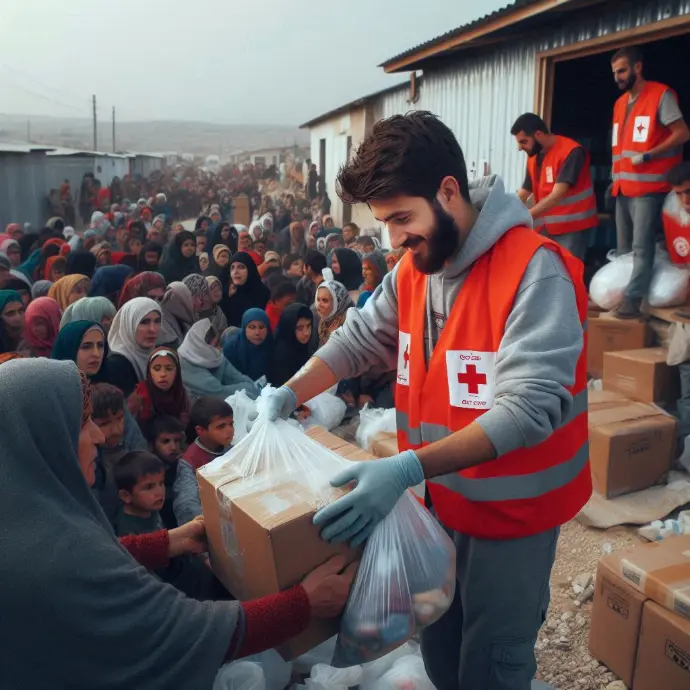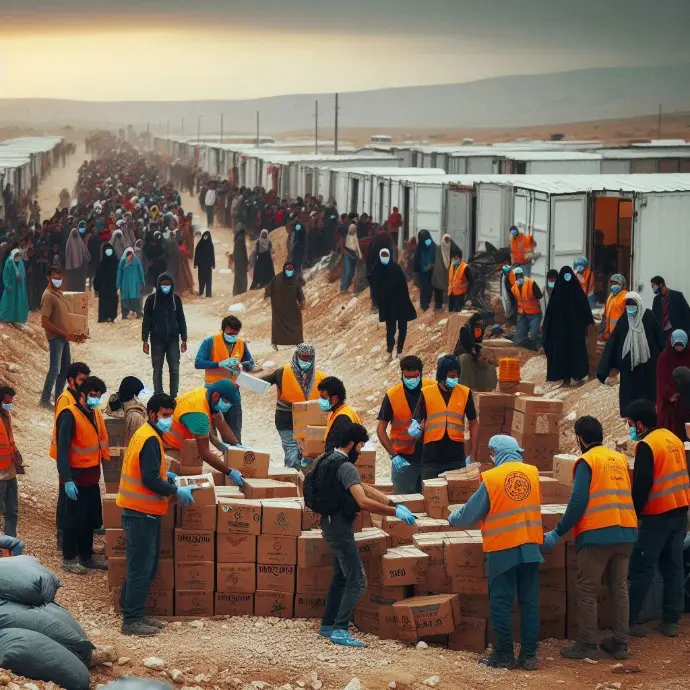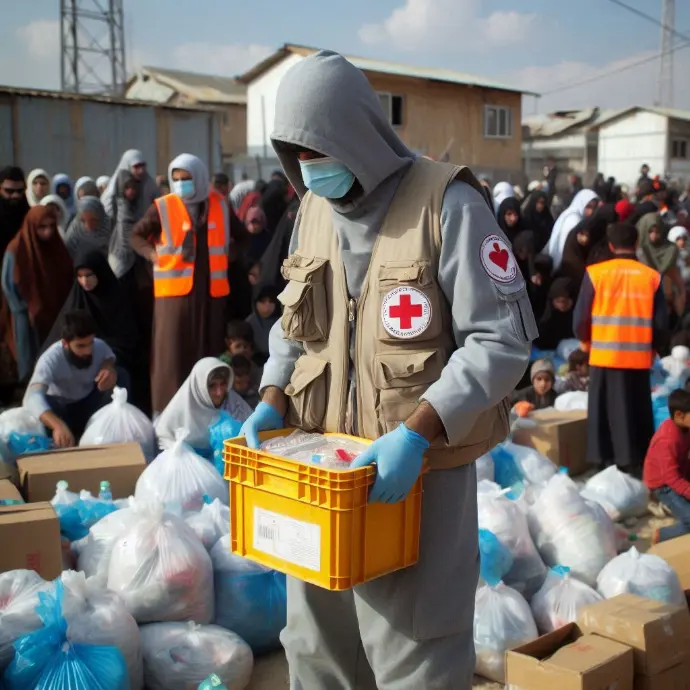The Role of NGOs: Humanitarian Assistance in Situations of Forced Displacement
Welcome to International Human Rights Organization, a space dedicated to the exploration and in-depth analysis of human rights worldwide!
Rights in Armed Conflict “Refugees” or “migrants” Rights of Vulnerable Groups
On this site, you will find detailed information on the crucial role of NGOs in humanitarian assistance in situations of forced displacement, a topic of utmost relevance in our Human Rights in Armed Conflict category. Get ready to discover the impact of humanitarian assistance on the lives of displaced people and the fundamental work of organizations in this field. Keep exploring to dive deeper into this fascinating topic!
Introduction
In the context of human rights, forced displacement refers to the situation in which people are forced to leave their homes due to armed conflict, violence, persecution, natural disasters, or other circumstances that jeopardize their safety and well-being. This phenomenon affects millions of people worldwide, generating a humanitarian crisis that requires an effective and coordinated response.
Forced displacement occurs when people are forced to leave their homes due to armed conflict, violence, persecution, natural disasters, or other circumstances that jeopardize their safety and well-being. This situation has serious humanitarian consequences, leaving displaced people in a situation of extreme vulnerability, exposed to homelessness, limited access to food and water, and risks of violence and abuse.
At the international level, forced displacement is regulated by international humanitarian law and refugee law, which establish the obligations of States and the international community to protect and assist displaced persons.
Humanitarian assistance in situations of forced displacement plays a crucial role in the protection and well-being of affected people, providing lifesaving support to address their immediate needs and promote their dignity and fundamental rights.
Humanitarian assistance plays a crucial role in the protection and well-being of displaced people, addressing their immediate needs for shelter, food, healthcare, water and sanitation, as well as protection from violence and exploitation. Furthermore, humanitarian assistance contributes to promoting the dignity and fundamental rights of displaced people by providing them with psychosocial support, education, and opportunities to rebuild their lives in a safe and sustainable environment.
In the context of mass or protracted displacement, humanitarian assistance also plays a crucial role in mitigating humanitarian crises, preventing the spread of disease, hunger, and despair, as well as promoting social cohesion and resilience in affected communities.
Humanitarian assistance in situations of forced displacement requires a comprehensive and coordinated response, involving governments, international organizations, NGOs, local actors, and affected communities, to ensure an effective and sustainable approach that meets the protection, well-being, and dignity needs of displaced persons.
Non-governmental organizations (NGOs) have played a vital role in providing humanitarian assistance in situations of forced displacement, often working closely with UN agencies, governments, and other stakeholders. Throughout history, NGOs have demonstrated their ability to respond quickly and effectively to humanitarian crises, adapting to diverse and complex contexts to provide assistance to displaced people.
NGOs have developed expertise and specialized knowledge in delivering humanitarian assistance, adopting rights-based, participatory, and needs-centered approaches. Furthermore, NGOs play a crucial role in advocating for the rights of displaced people, advocating for protection, justice, and dignity for those in situations of forced displacement.
The work of NGOs in humanitarian assistance is essential to complement and strengthen government and international organization responses, ensuring that specific needs are met, innovating intervention approaches, and promoting community participation in decision-making affecting displaced people.
Non-governmental organizations (NGOs) play a crucial role in providing humanitarian assistance to people displaced by armed conflict, natural disasters, or other emergency situations. Their impact on forced displacement is significant, as they provide lifesaving aid in terms of shelter, food, medical care, education, legal protection, and psychosocial support to displaced people. NGOs also play a critical role in defending the human rights of displaced people, advocating for their protection, and working to ensure they receive the support they need to rebuild their lives.
Furthermore, NGOs often work closely with government agencies, international organizations, and other stakeholders to coordinate the provision of large-scale humanitarian assistance. Their ability to mobilize resources, establish support networks, and reach remote communities is critical to addressing the needs of displaced people in crisis situations. NGOs' impact on forced displacement extends beyond the provision of immediate aid; they also work on long-term development programs to promote the sustainability and resilience of affected communities.
NGOs have demonstrated their ability to adapt to complex and dangerous environments, reaching places where other organizations cannot operate and providing assistance to those in the most precarious situations. Their presence in conflict and forced displacement zones is critical to ensuring that the most pressing humanitarian needs are met, and their impact is reflected in the improvement of living conditions and the protection of the fundamental rights of displaced people.
The Role of NGOs in Humanitarian Assistance in Situations of Forced Displacement
Humanitarian assistance in situations of forced displacement faces a series of challenges and obstacles that hinder its effectiveness. Among the main challenges are the lack of access to displaced populations, insecurity in conflict zones, scarcity of financial and logistical resources, and the complexity of the humanitarian needs of displaced persons, which range from the provision of food and shelter to medical and psychosocial care.
Furthermore, coordination between various humanitarian organizations and state actors is often complicated, which can lead to duplication of efforts, gaps in coverage of needs, and conflicts in aid distribution. These obstacles require efficient and coordinated strategies to overcome them and ensure the adequate provision of humanitarian assistance to forcibly displaced persons.
Non-governmental organizations (NGOs) play a fundamental role in protecting the human rights of forcibly displaced persons. Their work focuses on providing humanitarian assistance, legal protection, rights advocacy, and promoting community participation and social inclusion for displaced persons.
NGOs often act as advocates for the rights of displaced persons, advocating for respect for their dignity, safety, and well-being, as well as monitoring and reporting abuses, discrimination, and human rights violations in the context of forced displacement. Furthermore, NGOs play a crucial role in raising awareness and educating people about human rights, empowering displaced communities to know and claim their rights, and promoting the accountability of state and non-state actors to international human rights obligations.
NGOs develop a variety of humanitarian assistance programs and projects aimed at addressing the needs of forcibly displaced persons. These programs include food distribution, the provision of shelter and basic necessities, medical and psychosocial care, education, child protection, and the promotion of sustainable livelihoods.
In addition, NGOs implement projects to strengthen communities, empower women and vulnerable groups, promote peace and reconciliation, and facilitate the voluntary return and reintegration of displaced persons into their communities of origin.
These programs seek not only to meet the immediate needs of displaced persons but also to lay the foundation for their long-term recovery, development, and resilience, contributing to the comprehensive protection of their human rights in contexts of forced displacement.
Collaboration between NGOs, governments, and international organizations is essential to providing effective humanitarian assistance in situations of forced displacement. NGOs often have experience and expertise in providing humanitarian aid in crises, while governments have the power and resources to facilitate access to affected populations. On the other hand, international organizations, such as the UN and the Red Cross, play a crucial role in coordinating large-scale humanitarian responses and establishing international standards for assistance to refugees and displaced persons.
Effective collaboration between these entities can ensure that humanitarian assistance is delivered in a timely, efficient, and coordinated manner. Governments can provide logistical support, infrastructure, and security, allowing NGOs and international organizations access to affected communities. Furthermore, collaboration with local authorities is essential to understand the specific needs of displaced populations and ensure that the assistance provided is culturally appropriate and context-sensitive.
Cooperation between NGOs, governments, and international organizations can also help address the complex challenges that arise in situations of forced displacement, such as protecting human rights, providing basic services, and finding long-term solutions for refugees and displaced persons. By working together, these entities can leverage their respective strengths and resources to provide comprehensive assistance that addresses immediate needs and contributes to the long-term protection and well-being of people affected by forced displacement.
Impact of Humanitarian Assistance on Forced Displacement
Humanitarian assistance plays a crucial role in improving the living conditions of people displaced by conflict or natural disasters. By providing shelter, food, medical care, and other essential resources, NGOs and other humanitarian organizations contribute significantly to mitigating the suffering of displaced people and providing them with a safer and more dignified environment.
In addition to meeting basic needs, humanitarian assistance also seeks to promote the emotional and psychological stability of displaced people by offering emotional support, recreational activities, and educational programs for children and adults, in order to alleviate the traumatic impact of forced displacement.
It is important to emphasize that humanitarian assistance not only focuses on the provision of goods and services but also seeks to guarantee the protection of the fundamental rights of displaced people, including access to justice, security, and gender equality. Through empowerment and rights advocacy programs, humanitarian organizations seek to address the comprehensive needs of displaced people and promote their dignity and well-being in the midst of adverse situations.
Humanitarian assistance not only aims to meet the immediate needs of displaced persons but also to empower them to rebuild their lives and communities. NGOs work in partnership with displaced communities to provide tools, training, and resources that enable them to regain a degree of autonomy and control over their lives.
This can include job training programs, education, entrepreneurial skills development, and support for small business creation, all aimed at promoting self-reliance and sustainable integration of displaced persons into their new environments. By strengthening the capacities of displaced persons, humanitarian assistance not only provides them with the opportunity to regain their independence but also contributes to the revitalization of communities affected by forced displacement.
Furthermore, humanitarian assistance seeks to foster the active participation of displaced persons in decision-making that affects their lives, promoting the inclusion and representation of displaced communities in the planning and implementation of humanitarian programs. By involving displaced people in defining solutions and strategies, their sense of belonging is strengthened and their agency as individuals and as a collective is respected.
Humanitarian assistance not only focuses on mitigating the immediate impact of forced displacement but also seeks to promote the long-term resilience and recovery of affected communities. Through community development programs, reconstruction of basic infrastructure, strengthening social support networks, and promoting community cohesion, NGOs and other humanitarian organizations contribute to rebuilding the social fabric and revitalizing displaced communities.
Furthermore, humanitarian assistance focuses on promoting adaptation strategies and preventing future displacement, addressing the underlying causes of conflicts and humanitarian crises, and promoting the construction of more just, inclusive, and peaceful societies. In this way, humanitarian assistance not only seeks to respond to immediate needs but also to address the root causes of the problems that generate forced displacement, with the goal of building a safer and more sustainable future for those affected.
Current and Future Challenges
Humanitarian assistance in situations of forced displacement faces numerous challenges, one of the most pressing being the scarcity of resources and funding. As the number of displaced people continues to increase, non-governmental organizations (NGOs) are forced to compete for limited funding, hampering their ability to provide the necessary assistance.
This scarcity of resources directly impacts NGOs' ability to provide shelter, food, medical care, and other essential services to displaced people. Furthermore, a lack of funding can limit these organizations' ability to implement long-term programs that address the long-term needs of displaced people, contributing to the perpetuation of the humanitarian crisis.
It is critical that the international community and governments increase their financial support to NGOs and humanitarian agencies to address this funding gap and ensure that humanitarian assistance reaches those most in need in situations of forced displacement.
Forced displacement in the context of armed conflict represents one of the most complex and challenging situations for humanitarian assistance. People displaced by armed conflict face a range of risks and difficulties, from lack of access to food and shelter to exposure to violence and exploitation.
Furthermore, humanitarian operations in conflict settings can face significant obstacles, including lack of safe access to displaced populations, insecurity for humanitarian personnel, and the destruction of vital infrastructure. These challenges can hamper NGOs' ability to effectively deliver humanitarian assistance.
In this context, it is crucial that NGOs and humanitarian agencies have the necessary support and protection to carry out their work in conflict settings. This includes ensuring the safety of humanitarian personnel, advocating for safe and unhindered access to displaced populations, and working to address the underlying causes of armed conflict that generate forced displacement.
In the face of these challenges, NGOs and humanitarian agencies have demonstrated a remarkable capacity to innovate and develop good practices in the provision of humanitarian assistance in situations of forced displacement. From the use of technology to improve aid distribution to the implementation of community-based approaches to address the specific needs of displaced persons, numerous innovations have been developed in the field of humanitarian assistance.
Furthermore, collaboration between NGOs, government agencies, international organizations, and local communities has proven critical to the success of humanitarian operations in forced displacement settings. By working together, these entities can leverage their respective strengths and resources to ensure that assistance effectively reaches those most in need.
The identification and dissemination of these innovations and good practices are critical to improving humanitarian response capacity in situations of forced displacement and ensuring that the needs of displaced persons are effectively addressed.
Conclusions
The humanitarian assistance provided by NGOs in situations of forced displacement has a transformative impact on the lives of affected people. NGOs not only provide immediate relief, such as shelter, food, and medical care, but also offer long-term programs to promote self-sufficiency and emotional recovery. This comprehensive approach not only addresses basic needs but also contributes to rebuilding the dignity and hope of displaced people.
Furthermore, the constant presence of NGOs in areas affected by forced displacement offers ongoing support, allowing affected people to feel accompanied in their recovery process. This helps mitigate the psychological and emotional impact of the crisis, providing a sense of stability amidst adversity.
The work of NGOs in humanitarian assistance is not only crucial in terms of physical survival but also makes a difference in the rebuilding of entire communities, fostering resilience and hope amidst heartbreaking situations.
Protecting the rights of displaced persons requires effective global collaboration between governments, international organizations, NGOs, and civil society. This collaboration is essential to ensure that the needs of displaced persons are addressed comprehensively and in accordance with international humanitarian law.
Partnerships between different actors at the global level enable a coordinated approach to protecting displaced persons, ensuring that their fundamental rights are respected, including access to humanitarian assistance, protection from violence and discrimination, and the pursuit of long-term sustainable solutions.
Furthermore, global collaboration is essential to address the underlying causes of forced displacement, such as armed conflict, persecution, and climate change, in order to prevent future displacement crises. International cooperation in protecting the rights of displaced persons is a fundamental pillar in building a more just and supportive world for those in situations of extreme vulnerability.

 IHRO NEWS
IHRO NEWS

